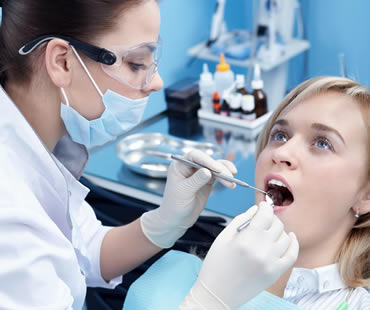
If you have a dental emergency, for example a knocked out tooth or jaw injury, contact your dentist in Ryde, Campsie, Kogarah, and Haymarket right away for care. Quite often dental problems will develop out of office hours, so it’s a good idea to know how to treat them until you can visit your dentist. The following tips will help you take care of yourself or someone close:
- Bitten Cheeks, Lips or Gums. Gently rinse the affected area using cool water. Use light but firm pressure to apply a clean piece of gauze or washcloth to stop bleeding. An ice pack can help reduce swelling.
- Bleeding Gums. Bleeding gums are frequently caused by gum disease or through brushing your teeth too hard. Rinse your mouth with warm water and be sure to thoroughly brush and floss your teeth as this will help reduce infection and inflammation. Book an appointment with your family dentist in Ryde, Campsie, Kogarah, and Haymarket for proper diagnosis and treatment.
- Canker Sores. It can help to wash the area with warm salt water. Avoid spicy or very hot foods until the canker sore begins to heal. If it fails to heal after two weeks, contact your dentist for advice.
- Cracked or Broken Tooth. Carefully rinse your mouth with warm salt water. Book an appointment with your dentist to have the tooth mended, and bring any broken pieces of tooth with you to the dental office.
- Loose Baby Tooth. Don’t attempt to pull out the tooth yourself, but instead encourage the child to gently wiggle it from side to side until it eventually comes out on its own.
- Teething Problems. Use a chilled teething ring or a cold washcloth to help soothe your baby’s gums. Gently rubbing the gums can also relieve some of the pressure.
Contact one of our dental offices Ryde, Campsie, Kogarah, and Haymarket

At least twice a year, you need to schedule an appointment with your dentist. These visits allow your dentist to assess you oral health, address any concerns you have, and look for signs of problems. Protecting your teeth and gums is a partnership between you and your dentist. For the best results, follow these helpful hints:
Find the right dentist in Ryde, Campsie, Kogarah, and Haymarket
Selecting a provider and dental office that fits your personality will make you more likely to keep your appointments.
Provide an accurate health history
Although your dentist’s primary concern is your mouth, overall wellness can impact your dental health. For example, chronic health issues like diabetes and HIV can increase your risk for gum disease.
Bring a list of current medications
Your dentist needs to know the names and dosages of any medicine you take regularly. Certain medications, such as pain relievers, allergy medicines, and anti-depressants, can cause dry mouth, which may make you susceptible to dental problems.
Report any issues right away
Sometimes, you may develop a toothache or notice bleeding gums between your visits. Don’t ignore these symptoms because they may indicate bigger problems. The longer you wait to address any issues, the more time and money you will lose.
Share your fears
For some people, dental visits cause anxiety or fear. Let your dentist know exactly what worries you. Most doctors want you to feel relaxed and comfortable, so they will take time to answer your questions and help you feel at ease.
Contact one of our dental offices Ryde, Campsie, Kogarah, and Haymarket

Using mouthwash is not a replacement for brushing and flossing, but instead is an addition to your oral care routine that can help you maintain healthy teeth and gums. If you’ve visited the mouthwash aisle at your local drugstore lately, you’ve seen that there is a giant selection of brands and types to choose from. It can be a bit overwhelming if you don’t know what purpose each one serves. Here is a description of the most common types of mouthwashes to help you choose.
Antiseptic
The goal of antiseptic mouthwash is to kill germs and bacteria in your mouth. It can also combat gum disease and persistent bad breath. Most dentists recommend that you discuss using antiseptic mouthwash with them before selecting this type, because they can help you decide if it’s needed for you. It can impact your sense of taste and can stain your teeth, so you want to be sure it’s helpful for you before using it.
Fluoride
The most common kind of mouthwash is fluoride, which utilizes the natural abilities of this mineral to strengthen your tooth enamel and prevent tooth decay and cavities.
Cosmetic
Designed to disguise bad breath, or halitosis, cosmetic mouthwash does not offer protection from problems like tooth decay. It can help keep your teeth clean and help rinse away food particles, but it is mainly for freshening your breath.
Combination
Mouthwash that combines purposes of the product is called combination mouthwash. It is meant to prevent tooth decay, maintain your oral health, and freshen your breath.
Prescription
Sometimes a prescription mouthwash is warranted for patients with gum disease or other types of decay. See your dentist to find out it this type of mouthwash would benefit you.
If you live in the Ryde, Campsie, Kogarah, and Haymarket area and you need a general dentist, contact us today.

Gone are the days when chewing gum is considered poor etiquette. In today’s society, you can find people chewing gum in business meetings, church, and just about every other situation. With gum chewing so prevalent, you may have wondered what it’s doing to people’s teeth. You may be surprised to learn that research shows that chewing sugarless gum has a number of dental benefits. Let’s see how it can actually be a helpful addition to your oral care routine.
Saliva flow
Chewing sugarless gum increases the flow of saliva in your mouth, which rinses away food particles. Saliva also neutralizes acids that result from bacteria in your mouth that can lead to tooth decay. Known to carry with it calcium and phosphate, increased saliva flow also helps strengthen your tooth enamel.
ADA acceptance
Choose gum with the American Dental Association (ADA) Seal, indicating it as met the required safety and effectiveness criteria. This approval means that you can trust the gum’s packaging and labeling to be true.
Sugarless
The only gums carrying the ADA Seal are sugarless. They contain sweeteners that don’t cause cavities, like aspartame, mannitol, sorbitol, or xylitol. Chewing gum with xylitol is especially recommended, because it has been shown to combat tooth decay and cavities.
Dental hygiene
Even though chewing gum can be beneficial, remember that brushing and flossing are still the best ways to care for your teeth. Brush twice a day with fluoride toothpaste, and floss every day to remove plaque and debris between your teeth. Between these dental hygiene tasks, however, it is acceptable to chew sugarless gum to continue caring for your mouth during the day.
Contact one of our dental offices Ryde, Campsie, Kogarah, and Haymarket

Fun in the summer sun can cause unpleasant side effects such as cold sores and fever blisters. Brought on by herpes simplex virus type 1 (HSV-1), cold sores and fever blisters are transmitted from person to person by saliva or by skin contact. With cold sores, you generally develop clusters of tiny blisters on the lip. Most people are exposed to HSV-1 before age 10. After the first infection, the virus remains inactive until stress, illness, or sun exposure causes a new outbreak.
During the first exposure, you may have headache, nausea, fever, and/or vomiting. Patients may also have painful swelling and open mouth sores. Most of the time, cold sores or fever blisters appear on the edges of your lips. Usually, these outbreaks start with tingling or burning followed by swelling or redness. One or more blisters will typically appear within 24 to 48 hours.
Initial symptoms can last for 7 to 14 days. When the cold sores or blisters reappear, they generally crust over in about four days and then heal within 10 days. You may want to visit your doctor or dentist the first time you develop cold sores or fever blisters, but after that, you shouldn’t need medical attention. Keep the area clean and apply topical medication to lessen symptoms as well as promote healing.
Preventing a first infection for loved ones involves making sure that no one with an active fever blister kisses your kids or other family members. Sunscreen can help protect your lips from cold sores brought on by too much time in the sun.
Dentist in Ryde, Campsie, Kogarah, and Haymarket

What you eat and drink can affect your oral health. A balanced diet will boost your body’s natural immune system, helping to lower your risks for oral problems. There are also certain foods and drinks that you should avoid in order to pave the way for healthy gums and strong teeth. Read on to learn how to ensure that your smile is safe and strong.
Cut down on snacks
Try to limit snacking between meals. The more often you eat, the more bacteria is stimulated and more acid is created. It is especially harmful to snack on sweet or starchy foods, which can harm your teeth and gums more quickly.
Limit sugar
Avoid foods and drinks that are high in sugar. It can stick to your teeth and if not removed promptly and thoroughly, can lead to tooth decay.
Watch what you drink
Drink plenty of water, and avoid sodas and fruit juices. Both of these can be sugary and acidic, which can harm your tooth enamel and cause decay.
Maintain a healthy diet
Try to eat a balanced diet consisting of the five major food groups. A well-balanced diet provides the vitamins, minerals, and other nutrients that your teeth and gums need. Fresh vegetables and fruits, and foods rich in calcium, are good choices for your oral health.
Practice good oral hygiene
Contact our Ryde, Campsie, Kogarah, and Haymarket dental offices to learn about good dental hygiene techniques that will help you prevent tooth decay and gum disease. Brush your teeth at least twice a day, floss daily, and see your dentist for regular checkups.
Contact one of our dental offices Ryde, Campsie, Kogarah, and Haymarket










